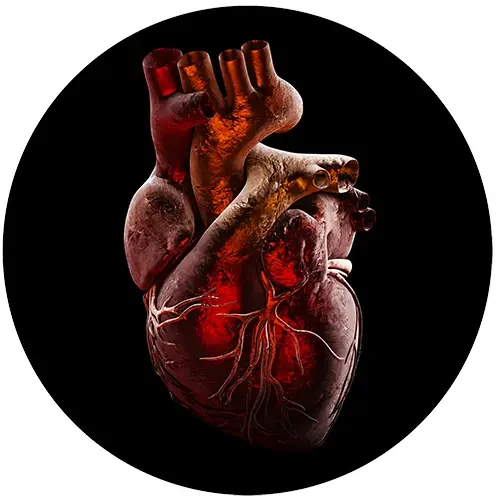Muscle pains
Overview: Muscle pain, also called myalgia, is a common symptom of Fabry disease, one of the spectrum of HCM-like disorders.
Background
Muscle pain is extremely common. We have all exercised too much and been sore for a few days. But sometimes muscle pain is not due to overuse. When it occurs with activity (not the day after) in someone with symptoms of HCM, one possibility is that the patient may have Fabry disease.
What causes Fabry disease?
Fabry disease is a rare genetic disease. People with this mutation cannot break down certain fatty substances. As a result, they accumulate in a part of the cell called a lysosome.
Because the gene is located on the X-chromosome, males are much more likely to have Fabry disease than females. The disease is inherited like color-blindness or other sex-linked genes: if the mutation is on the father's X-chromosome, every child will inherit the mutation. If the mutation is on one of the mother's X-chromosomes, half her children will inherit it. If both of the mother's X-chromosomes carry the mutation (and this is very rare) all children will inherit it. In every case in which a child inherits the mutation, male children are likely to have the disease.
About 2-4% of people with symptoms of HCM have Fabry disease.
Treatment
Because it is rare and it mimics HCM, it sometimes takes a long time for a person to be correctly diagnosed as having Fabry disease.
Some treatments are symptomatic. For example, drugs like beta blockers or calcium channel blockers may be used to slow the heart rate and improve heart function. Arrhythmias are also treated symptomatically.
There are no cures for Fabry disease at present, but patients who are diagnosed early enough often benefit from specialized drugs that can replace or mend the absent enzymes. Fabry disease may be treated using enzyme replacement therapy (ERT) to help normalize heart and kidney function as well as blood supply to vital organs such as the brain. This therapy focuses on replacing the deficient enzyme. Other treatments are available including phenytoin (Dilantin), carbamazepine (Tegretol), or gabapentin (Neurontin) which may help prevent episodes of pain and burning sensations. Opioids may also be prescribed in order to alleviate severe pain. Aspirin may be prescribed to prevent recurrent ischemic strokes. Warfarin (Coumadin) may be prescribed for cardioembolic strokes. There is a chance that the patient with Fabry disease has kidney failure in which hemodialysis and kidney transplantation may be necessary. In addition to medications, patients should eat a balanced diet and avoid smoking.
HCMA 6/2021










